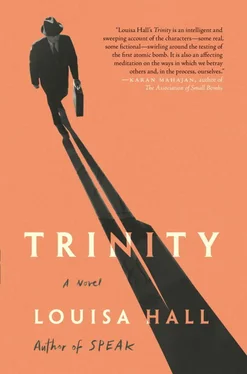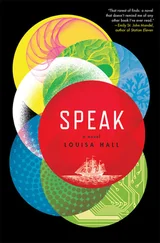And it hadn’t been exactly easy for me. Maybe living in the reckless fat way that I lived was easier than starving myself like my sister. But still, it hadn’t been easy, exerting all the effort to live for us both, and now here I was, trapped in this bed, and I looked over my shoulder and realized she wasn’t with me.
She wasn’t at the end of the line. There I was, alone in my distress, utterly alone in that bed with my pearl necklace still on and my gross breasts slopped all over my body, and I was suddenly angry.
Then I started sweating. I wanted to sit up, but I couldn’t. His weight was pressing down on my body, weighing me down, with his hand shoved in my mouth like I was some fat naked catfish, violently pulled out of hiding, and I thought: Enough. Enough. I’ve had enough of this lonely role that I’m playing.
Then I gagged out the hand and heaved myself up from the bed. I covered my chest with my arm and told him I was going out to the sofa.
He asked me if I was OK. Then he apologized if he’d done anything wrong. Then offered to let me sleep on the bed.
Nevertheless, however, I was insistent, so once I’d rooted around for my sweater, and buttoned my skirt over my stockings, I went out to the sofa, and in the morning, when I woke up, Stan was banging around making coffee.
He was wearing a plaid shirt buttoned up to his neck. He looked fresh faced and happy, the image of a wholesome American boyfriend.
“Good morning,” he said, and he smiled, and handed me a cup of freshly made coffee.
WE SEEMED, SOMEWHAT UNBELIEVABLY, TO HAVE EXPERIENCED TWOdisparate evenings. I’d been prepared to feel ashamed of myself for having acted like one kind of girl and then suddenly flipping into another, but Stan beamed down upon me as though we were both starting out fresh as new people.
Later, I learned that Stan had a remarkable ability to forget that which was at all inconvenient. In that moment, however, I wondered if he was amnesiac, or crazy. Somewhat unnerved, I took the cup of coffee he’d made. He stood smiling above me, as though he’d come out of his bedroom and been surprised and not one bit displeased to find me sprawled on the couch, washed up overnight like an overweight mermaid.
When I joined him at the table that was set up in the kitchen, he told me he’d been accepted to Princeton’s doctoral program in politics. Then he supplied the details of his graduate stipend, and the conditions of family life in faculty housing, as though he were answering questions I’d asked him. He was behaving as though I’d sat down in the kitchen to interview him for the position of husband, and to be honest, sitting there, quietly drinking my coffee on the morning after I realized my sister had abandoned me for her fast, I began to wonder whether I might in fact be interested in having Stan fill that position.
Politely, keeping my ankles crossed, I listened while he covered the salient points: his service in the air force, his course of study, his family background, the suburb they’d moved to.
Then he asked me a few questions: what I majored in, if I wanted children, where my family summered, my father’s profession.
He seemed pleased with the answers, or pleased enough to forget the previous evening, and as I continued sipping my coffee, assisted by Stan’s remarkable ability to forget things, I began to feel like a respectable person.
I began to imagine the house we might share, the garage, the bedspreads, the little frilled pillows.
Then I began to enjoy telling Stan about how much I wanted children, about how well I got along with my mother, about how I’d always dreamed of a daughter.
OBVIOUSLY I WAS MAKING EVERYTHING UP.
I didn’t think I’d marry Stan. I didn’t love him, and I believed my mother wouldn’t approve of the match. I had already begun to suspect that though Stan did go to Princeton, his family probably wasn’t quite up to snuff: otherwise why would he have been at that table, interviewing for the position of husband.
So I was making everything up. It was all just a new story I’d decided to tell, one that was less frightening to me than the last one.
By the end of that cup of coffee, I’d described to him our house in the suburbs, our fictional daughter, our fictional son, the sports he played, and the lunch box she carried.
I was telling such a good story that Stan seemed truly touched. He was becoming fond of those children. When the hour was up, and it was time for him to go to the library and study, he asked for my address so he could write me a letter.
A letter! Not even a phone call. As if I were so pure and old-fashioned I could only be reached via post.
FOR A WHILE, AFTER THAT, STAN WROTE ME LETTERS, AND I RESPONDEDin kind.
At first, it was just a minor part I was playing. The girl who wrote him letters back was only one voice in the novel. In the meantime, even as she spun her quaint yarns, I kept up my other lives, still sometimes eating too much, still writing fat novels in secret, and still sometimes performing regrettable roles on the double dates I went on with Kathy.
Nevertheless, however, I enjoyed my correspondence with Stan. I enjoyed it so much that every time he suggested a trip up to see me, I elegantly parried his efforts.
For many months, we just kept writing. In sweet, economized prose, I wrote to him of our summer house, the yard he cut on the weekends, the beach where we played with our children.
And maybe that pattern could have gone on forever, but that spring my father called to tell me my sister had died overnight.
Her heart stopped, my father said. I had to come home for the funeral.
AFTER THAT, I WENT AROUND, GOING THROUGH THE MOTIONS OFlife, no longer holding the thread that attached me to my sister.
Six or seven months later, I married Stan, and for a while I guess we were happy.
NOW I NEED TO TAKE A BREAK. I NEED TO CLOSE MY EYES FOR A WHILE.
Actually, wait. Don’t go. If I stop now I’ll never start up again, and I want to get this all down.
It is what it is, a whole horrible mess. Believe me, I hate it, too. But now that we’ve started let’s just keep going. I want to tell you what happened after I married Stan, which is how I ever met Robert to start with.
AS SOON AS STAN AND I WERE ENGAGED, I DROPPED OUT OF ROSEMONT.Then I lived with my parents at home. Stan felt it was proper, and I agreed, so for a few months I lived in my childhood bedroom while my mother and I made plans for the wedding.
By then, things had changed in my family. My parents were lost. They didn’t comment on Stan’s last name, or ask me about the clubs his parents belonged to. My mother failed to wonder about Stan’s swarthy complexion. She simply accepted that a wedding was coming. Then we went to Saks and found a nice dress, with lace sleeves, and a long line of cloth-covered buttons. At the florist, we chose the white calla lily arrangements. I sat in the store with my hands in my lap and agreed with all of my mother’s decisions.
BY THEN, I HAD BECOME A MORE OBEDIENT DAUGHTER. THERE WASno longer any need to rebel. My sister was gone, and my father had faded into the background, so it was me and my mother in that story together.
Sometimes, she drove me downtown to the art museum. We stood in the rooms devoted to Renaissance paintings, surrounded by virgins and Roman soldiers and saints, serpents and lambs, satyrs and sylphs, and dark-eyed Christian martyrs whose breasts were about to be sliced off their torsos.
For dinner, my mother cooked meals I’d liked as a child—lamb chops and canned petit pois —and in gratitude, I didn’t eat much.
Читать дальше












